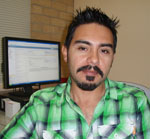 The events that have unfolded in Tunisia, Egypt, Bahrain, Yemen, and now Libya, may be unexpected to most observers, but they are not isolated historically or politically, according to a Charles Sturt University (CSU) academic.
The events that have unfolded in Tunisia, Egypt, Bahrain, Yemen, and now Libya, may be unexpected to most observers, but they are not isolated historically or politically, according to a Charles Sturt University (CSU) academic.Dr Oliver Villar, a lecturer in politics at the School of Humanities and Social Sciences at CSU in Bathurst, says that while the West presently focuses on old foe turned partner, Libyan leader Muammar Gaddafi, we should pay close attention to what are truly historic events in the Middle East and North Africa.
“The people of Egypt, Venezuela, even Colombia, which is the leading recipient of US military aid in the Western Hemisphere, and whose people have been fighting for democracy and social justice for well over half century, have shown that another world is possible,” Dr Villar said.
“The United States and Britain have always seen the Middle East as a vast land mass of oil reserves, and it is very interesting that it is events in Egypt which have ignited the democratic movements presently spreading east and west across the region.
“Egypt was once a beacon of secular Arab nationalism in the region. Throughout the 1950s and 1960s, President Gamal Abdel Nasser won a great following in the Arab world. As a nationalist, he became famous for investing Egypt’s oil wealth to develop a program of modernisation for his country, much like what is presently happening in Venezuela under President Hugo Chavez, and he undertook an independent foreign policy which was of concern to powerful financial and oil interests in the West.
“The now-ousted Egyptian dictator, Hosni Mubarak, who was deposed by a popular uprising earlier this month, was a key US ally in the Middle East. Under Mubarak, Egypt, along with Israel, the US’s other key strategic ally in the region, was the leading recipient of US military aid and a transit point of torture for 'terrorist' suspects in the US's global 'War on Terror'. Although Mubarak has fled the country, there have been few signs of popular organising, except for the transfer of authority to a military council called the Supreme Council of the Armed Forces (SCAF) and the recently appointed Vice President, Omar Suleiman. As in most developing countries, the power seems to be resting with the military which has strong financial and political ties with the US. Despite the ‘impossible struggle’ and the challenges which lie ahead, the Egyptian revolution, which is led by the poorer sectors in the country, seems to be resonating their call for democracy throughout the region. It is a struggle worth fighting for and coincides with political events in Latin America of the past decade.
“Former President Mubarak is believed to have amassed up to $70 billion during his reign. It remains unclear whether that money will be returned to the Egyptian people, or whether it will remain in Europe. If a ‘Latin Americanisation’ of the democracy movement begins to materialise with a radicalisation of regional politics at a state level, it will most likely be seen as a threat to US policy and military and financial interests which are the ‘glue’ that maintains the elite.





Social
Explore the world of social